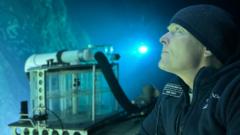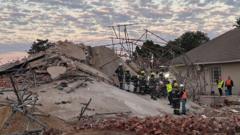*Former Oceangate employee details his warnings about equipment flaws and regulatory failures that preceded a fatal dive.*
**Titan Whistleblower Exposes Safety Failures Amid Tragic Submersible Disaster**

**Titan Whistleblower Exposes Safety Failures Amid Tragic Submersible Disaster**
*David Lochridge reveals alarming safety concerns leading up to the Titan submersible tragedy.*
In June 2023, the Titan submersible tragically imploded during a dive to the Titanic wreck, resulting in the deaths of five people, including Oceangate’s CEO Stockton Rush. David Lochridge, a former director of marine operations for Oceangate, alleges that serious safety concerns were ignored by the company and the regulatory bodies meant to ensure public safety. Lochridge, who had been dismissed for voicing these concerns, now believes that lax oversight and flawed design led to the disaster.
Lochridge had high hopes when he joined Oceangate, drawn by its ambition to offer unprecedented deep dives to tourists. However, his excitement turned to alarm as he identified numerous faults with the Titan sub, particularly its carbon fiber hull and inadequately designed components. He emphasized to his superiors the necessity of independent safety certification, which was absent when Oceangate decided to bring the design work in-house.
Demanding accountability, Lochridge formally submitted a report outlining his worries, but faced significant resistance from Rush and other higher-ups. When he was let go after seeking to delay the maiden dives, Lochridge reached out to the Occupational Safety and Health Administration (OSHA). His whistleblowing attempts, however, were met with bureaucratic problems. OSHA later referred its investigation to the U.S. Coast Guard (USCG), but their reporting found that OSHA’s slow response hindered timely intervention.
Lochridge has been vocal about his belief that thorough oversight could have prevented such a tragedy. He expressed frustration regarding the regulatory failures, stating that it was a systemic breakdown that led to unqualified and unsafe practices within Oceangate. The USCG's own report corroborated Lochridge's claims, indicating that much more should have been done by government agencies to address his safety alerts effectively.
In the fallout of the Titan disaster, Oceangate has reportedly ceased operations and pledged to cooperate fully with ongoing investigations. Meanwhile, Lochridge remains outspoken against the severe lapses that he argues could have made deep-sea exploration safer if adequately addressed. As the community grapples with the loss, his warnings resonate deeply, advocating for a comprehensive reform in safety measures for future expeditions.
Lochridge had high hopes when he joined Oceangate, drawn by its ambition to offer unprecedented deep dives to tourists. However, his excitement turned to alarm as he identified numerous faults with the Titan sub, particularly its carbon fiber hull and inadequately designed components. He emphasized to his superiors the necessity of independent safety certification, which was absent when Oceangate decided to bring the design work in-house.
Demanding accountability, Lochridge formally submitted a report outlining his worries, but faced significant resistance from Rush and other higher-ups. When he was let go after seeking to delay the maiden dives, Lochridge reached out to the Occupational Safety and Health Administration (OSHA). His whistleblowing attempts, however, were met with bureaucratic problems. OSHA later referred its investigation to the U.S. Coast Guard (USCG), but their reporting found that OSHA’s slow response hindered timely intervention.
Lochridge has been vocal about his belief that thorough oversight could have prevented such a tragedy. He expressed frustration regarding the regulatory failures, stating that it was a systemic breakdown that led to unqualified and unsafe practices within Oceangate. The USCG's own report corroborated Lochridge's claims, indicating that much more should have been done by government agencies to address his safety alerts effectively.
In the fallout of the Titan disaster, Oceangate has reportedly ceased operations and pledged to cooperate fully with ongoing investigations. Meanwhile, Lochridge remains outspoken against the severe lapses that he argues could have made deep-sea exploration safer if adequately addressed. As the community grapples with the loss, his warnings resonate deeply, advocating for a comprehensive reform in safety measures for future expeditions.




















